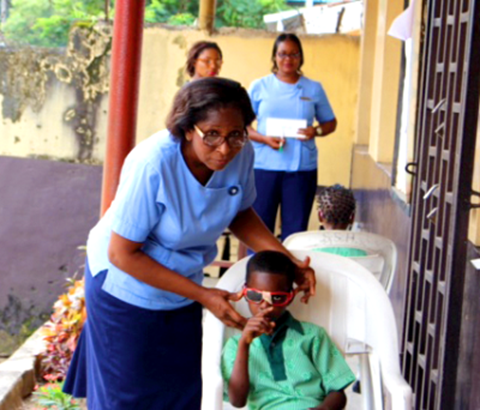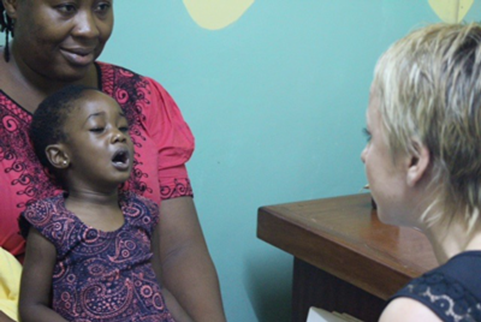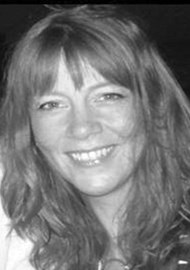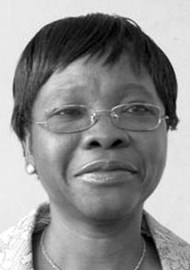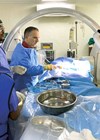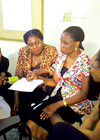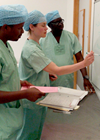The Lagos-Bolton VISION 2020 LINK started in December 2011. It is one of 29 LINKS now running in the VISION 2020 LINKS Programme [1]. Nigeria is the most populous country in Africa, with a current population of 178 million, projected to increase to 229 million by the year 2025. Nigeria has overtaken South Africa to have Africa’s largest economy; it has significant agricultural resources and oil wealth, yet poverty is widespread. At least 60% of the population (over 100 million people) live below the poverty line on less than 1.25 USD per day.
Lagos is the largest city in Africa and is located in the Southwest geopolitical zone of Nigeria. It has an estimated population of 21 million and is the commercial nerve centre of the country.
According to the Nigerian National Blindness and Visual Impairment Survey undertaken between 2005 and 2007 [2], the prevalence of blindness in the Southwestern zone of Nigeria where Lagos is located was 2.79%, while the prevalence of severe and moderate visual impairment was 0.88% and 9.64% respectively. The survey identified cataract as the most common cause of blindness.
The Department of Ophthalmology of Lagos University Teaching Hospital (LUTH) – known as Guinness Eye Centre (GEC) – is the main provider of tertiary eye care for Lagos and surrounding area and is a major training centre for ophthalmologists in Nigeria. It has seven consultant ophthalmologists including a vitreoretinal surgeon and a paediatric ophthalmologist. There are 27 trainees with a full complement of nurses. There are three optometrists but until now, no orthoptist. The GEC is a purpose-built eye care centre with an operating theatre, although it is some decades old and in need of maintenance and upgrading.
Over the last four years, the Lagos-Bolton LINK partners have worked together to help the Lagos team tackle their priorities for improving eye care services for the people of Lagos. Already much progress has been made.
VISION 2020 LINKS are based on regular training visits between multidisciplinary teams. There have been 11 training visits between the partners. So far, 10 NHS staff have visited Lagos, including doctors, nursing staff, an orthoptist, senior managers and trainee ophthalmologists. A total of 13 Lagos staff have visited the UK.
As a result of these visits, and continuous communication via email, the partnership between the LUTH and Bolton NHS Foundation Trust has flourished. Although not without challenges, the teams on both sides of the LINK have worked together to overcome difficulties, learning from their experiences and improving their services as a result.
Photo 1: Vision screening in a Lagos school.
Learning from the Bolton LINK partner
There have been many new and encouraging advances in different areas of the Lagos Eye Unit, such as retina and paediatric ophthalmology. In addition, the personal development of staff on both sides of the LINK has been nurtured, ensuring that progress will continue for many years as a result of the team’s hard work and commitment to providing an improved service for their patients.
Professor Folasade Akinsola is the LINK Coordinator in Lagos and Clare Inkster is the LINK Coordinator in Bolton. The Lagos team chose two priority areas to work on with the Bolton team – these were paediatric ophthalmology and retinal services. The diabetic retinopathy services have been strengthened through participation in the DR-NET (Diabetic Retinopathy Network) which is part of the Commonwealth Eye Health Consortium, funded by The Queen Elizabeth Diamond Jubilee Trust [3]. In addition, there has been training in relation to leadership and education. An earlier visit delivered a leadership course to a multi-professional team [4]. In 2014 the LINK was successful in winning an award in the XOVA Program run by Novartis, which has been a very useful contribution towards the funding needed to undertake LINK training visits [5].
The most recent visit to the UK in September 2015 focussed on the senior leadership and education team. Professor Adeola Onakoya is the residency training programme director for ophthalmology at LUTH. She described her visit:
“The team members were myself and Mr Tajudeen Ibrahim, the Director of Finance of LUTH. The Chief Medical Director of LUTH, Professor Chris Bode was due to be on the visit, but was unable to get his visa in time.
Over the five days, various administrative and clinical departments in the hospital were visited and the main objectives of each were discussed with individual leads. Lessons were learnt and action points for implementation in our home departments were developed.
We visited leads for the following departments: quality and governance, finance department, equality and diversity, governance, fundraising, estates and infection control. We had a fascinating and fulfilling week with the Chief Operating Officer Andy Ennis and the ophthalmology department.
We learned about, amongst other things, safety, patient experience, clinical procedures and performance, staffing and infrastructure. We enjoyed hearing about good reporting systems emphasising instant reporting: ‘no blame game’. We witnessed great professionalism with emphasis on integrity, compassion, respect and attentiveness. Other important areas included medical audit, appraisal and staff feedback. We learned about the UK system for revalidation and remediation of staff and the use of categorisation matrix for events.
We were fortunate to be able to observe a Board meeting of the NHS Trust led by the Chairman, David Wakefield. This afforded the opportunity of meeting other executives of the Trust, notably the CEO Dr Jackie Bene and Medical Director Steve Hodgson. A session on residency training programmes was also held with Clare Inkster in her role as Associate Postgraduate Dean, Health Education North West.
As part of the initiative to source funding for hospital infrastructure development at LUTH, we visited Bolton School and a meeting was held with the Development Officer and Clerk and Treasurer to get an insight into methods and approaches adopted towards the building of their new school classroom blocks through the help of donors and philanthropists.
To round off the visit, we visited media company Bolton News, to emphasise the need to work with local media for the purpose of positive publicity to enhance the image of the institution and help with fundraising.”
Tajudeen Ibrahim, Director of Finance at LUTH, was also very keen to learn from the visit:
“The training I received in Bolton was a very rewarding and fruitful experience. We were able to meet fundraising and development staff at two major institutions – Royal Bolton Hospital and Bolton School – and discuss fundraising issues. The outcome was very revealing and exposed me to another world of innovation in fundraising.
At the Royal Bolton Hospital I met Andrew Lee, the Head of Bolton NHS Trust Charitable Fund. He took us through various ways in which voluntary donations can provide additional sources of funding to the Hospital. To provide, for example, new pieces of medical equipment, little extras for patients and specialist training for staff to enhance their ability to deliver up-to-date care.
The charity often receives donations from grateful patients and relatives after receiving treatment, as well as the local business community, general public and local community organisations. These donations have paid for many enhancements over the years. They include the state of the art coronary care unit, play areas for children, a Jubilee garden and medical equipment including ventilators, cardiac monitors and blood analysers.
At Bolton School there is a Development Team that is tasked with the responsibility of generating funds for new projects in the school. We met the head of the team who took us through the various ways funds could be raised. It was a very interesting and eye-opening experience for me.”
Photo 2: Vision screening training underway in LUTH.
Learning from the Lagos LINK partner
The Lagos staff are not the only ones to have learned through the LINK. The Bolton team have been hugely impressed by the commitment and dedication of the Lagos team, which have resulted in significant change over the past four years.
Clare Inkster commented on her recent visit to Lagos:
“Three days into our visit to Lagos, and the learning has been intense. There have been four main areas of work: children’s vision screening, diabetic retinopathy screening, leadership and educational supervision training.
I was involved in delivering a course on educational supervision for secondary care consultants in Lagos State. During recent visits of trainees from Lagos to the UK, it was noticed that virtually all training takes place at the teaching hospital, the (GEC) which is part of LUTH. There are currently 24 trainees and eight consultants with only one operating theatre and five consulting rooms. This leads to understandable problems with access to surgical and clinical experience. Trainees are able to undertake very few operations, and rarely have the chance to see patients from start to finish. One trainee noted that time at work really drags.
During the recent senior management and education team visit to Bolton, it was noted that there are several secondary care hospitals in Lagos that do not have trainees. Consultants have themselves been through the training programme at LUTH, but have not had specific training for supervising trainees.
Therefore a course was designed by Prof Onakoya and Clare Inkster and delivered on the recent LINK visit to Lagos, with very positive feedback. The plan now is that trainees will spend up to three months working in pairs at the secondary care facilities. This will ensure high volume clinical and surgical training for the trainees, increased service delivery, and professional development for the consultants at the district hospitals. There is a plan to evaluate the new placements to ensure quality training and patient care.
It was extraordinary, for me, to see how open the Lagos consultants were to new ideas. The phrase, ‘pushing against an open door’ really took on new meaning. I felt completely rejuvenated by working with consultants who appeared to be completely free of cynicism. It was particularly interesting to note the commonality between Nigerian and British curricula.”
Clinical learning through the LINK partnership
Alison Wilson is an orthoptist in Bolton and is also very positive about the LINK’s progress so far:
“Paediatric eye care is one strand of the VISION 2020 LINK between Lagos and Bolton. The multidisciplinary team consists of myself, Dr Musa, who is a consultant ophthalmologist specialising in children, and Ada Okoronkwo, an optometrist at the Guinness Eye Centre at LUTH.
The partnership between the teams has taken a three-pronged approach:
- Orthoptic assessment to support the ocular motility service
- Paediatric vision testing
- Visual screening.
Orthoptics, the study of squints, lazy eye and eye muscle defects, is not a service that is found in Nigeria and therefore there was a gap in specialism within the paediatric service developed at the eye clinic by Dr Musa. Ada has worked closely with the Orthoptic Department in Bolton over three visits to fill this void and is now actively using this knowledge in specialist clinics at LUTH.
The second two points encompass the central focus of the VISION 2020 initiative – avoiding preventable blindness. The accurate assessment of paediatric visual acuity is pivotal to paediatric eye care as without this, conditions and / or the effects of conditions and decision to treat cannot be assessed accurately. It is also essential as a formal measurement of whether intervention or treatment has been successful.
Visual acuity training has been primarily undertaken in Bolton when Ada has been visiting the Bolton Orthoptic Department. This was consolidated on the last training visit, when a logMAR training package was worked on, which Ada then disseminated to a multidisciplinary team on her return to Lagos. The rewards of this were visible during the recent visit to Lagos, with paediatric vision now being assessed by nursing staff in clinics.
Visual screening is a programme designed to detect defects before the critical period of visual development has been reached by age 7/8 years. Early detection and treatment reduces the incidence of amblyopia and the possibility of visual impairment at any age. In 2013, the Lagos-Bolton paediatric team partners visited a primary school. This may have been the first such visit to happen within eye care in Nigeria. Partnership was clearly illustrated on the trip, with Ada and myself working side by side to test the children.
The dissemination of paediatric vision testing was also demonstrated when a team composed of an optometrist and nurses from LUTH carried out vision screening on 80 children from a local school during the most recent LINK visit by the Bolton team. In alignment with referral rates in Bolton, 20% of children required a referral to the Eye Clinic for further investigations and treatment. This clearly demonstrates an unmet need and development of children’s vision screening will continue to be one of our aims for the LINK.
The paediatric team, in partnership between Bolton and Lagos, are continuing to work effectively together. We will continue to look at early interventions to prevent visual impairment in childhood so as to avoid lasting visual and social difficulties.”
Summary
As can be seen from the testimonies above, it would be easy for the partners to be overwhelmed by the sheer scale of the task at hand. However, the dedication of those involved, as well as the optimistic and thoughtful approach exhibited by all the LINK participants in Lagos and Bolton, is bringing about continued improvement and successes in all the priority areas identified by the Lagos team back in 2011.
The LINK partnership continues to work together to devise innovative and effective strategies to improve eye care services for children and adults through ophthalmology and leadership training and infrastructure development. Without question, the only way for the Lagos-Bolton VISION 2020 LINK is up!
References
1. VISION 2020 LINKS programme. International Centre for Eye Health.
http://iceh.lshtm.ac.uk/
vision-2020-links-programme/
Last accessed January 2016.
2. Nigeria national blindness and visual impairment survey. International Centre for Eye Health.
http://iceh.lshtm.ac.uk/nigeria-national-
blindness-and-visual-impairment-survey/
Last accessed January 2016.
3. Poore S, Foster A, Zondervan M, et al. Commonwealth nations join forces to prevent blindness from diabetes. Eye News 2015;21(5):33-6.
4. Subramani S, Okoronkwo A, Robinson J, et al. Developing leadership for eye care in Nigeria: the Lagos-Bolton-North Western Deanery VISION 2020 LINK. Eye News 2013;20(3):28-33.
5. Grant Recipients 2014. Excellence in Ophthalmology Vision Award.
http://www.xovaprogram.org/winners2014.html
Last accessed January 2016.
Acknowledgements
The authors would like to say a special thanks for the great contributions in putting this paper together: Dr Onakaya, Mr Ibrahim, Mrs A Wilson and Miss S Inkster for their keen writing skills and responses.
COMMENTS ARE WELCOME

